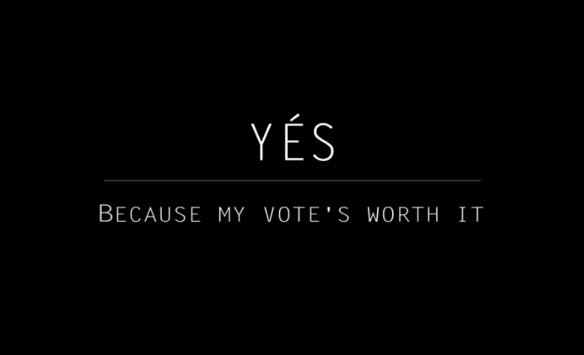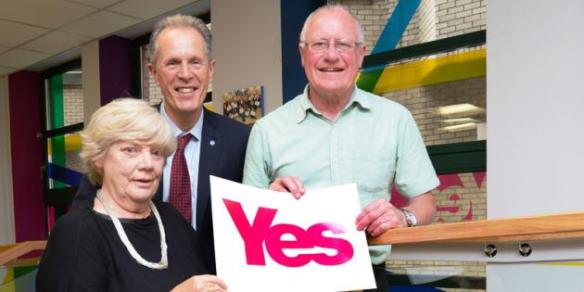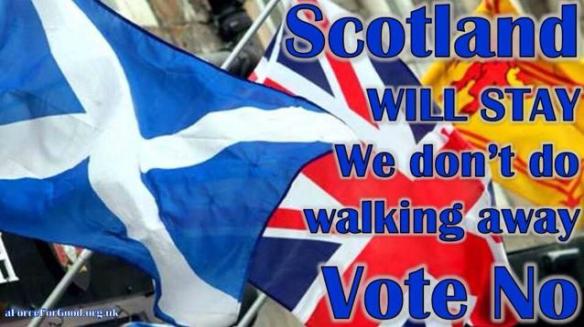I was lucky enough to have a hand in bringing the world down in 2008.
Not a very big hand, of course. I was a headhunter. I found a certain kind of person for a certain kind of bank. The kind of person I found could best be described as being like Matt Damon from Good Will Hunting. The banks I found them for were all the ones which exploded.
I want to give you a very specific insight into something, some revelations that have recently surfaced about how the finance sector will react to Scottish Independence. This seems a little abstract, but isn’t for the thousands of Scottish people who work in finance – it is vast here. Vast. Here’s my take on this, and this is informed by the intimate knowledge and privileged view I had of the culture, personalities, systems and insanity that led to the last crash, and what all this means for us.
Because there is a real simplicity to this. Something very simple has just hoved into view. No side that I’ve heard is talking about it. I’m going to hit it as fast as I can, but we’re covering a lot of ground, so try to keep up.
The explosion of 2008 has not been communicated to the people. It’s been broken down into little buzzwords. ‘Risky bets’. Stuff like that. The kind of stuff that fits in a red-top headline. But that’s not what happened.
What happened is arrogance. What happened is systemic arrogance buttressed by absolute faith in mathematics so complex that only a tiny few could ever understand them. Mathematics of probability and chance so arcane that they could make anything seem like anything else. They could make risk vanish. And they did. And then the madness began to truly spiral.
If you have a bet you have no risk on, the amount of profit you make is just the amount of money you can slap down on the table. Banks have billions – but billions weren’t enough. They didn’t bet the money they had, or even the money they managed. They did something else.
They took all that money, and used it as collateral to borrow massively more at incredibly high interest rates. From who?
Well, from each other, of course. From each other, because they all knew that the money would be earned back because it would be placed into riskless bets that could never fail.
Complexity onto complexity, abstraction onto abstraction, further and further down the rabbit hole of mathematics until the entire mental world these men (all men) occupied was so far away from reality that full noonday sunlight seemed to it like the twinkling of a distant star.
But there was simplicity too. Real simplicity. That if you borrow money to bet, and take all the profits of your betting, and put that down as collateral so you can borrow even bigger and even bigger sums of money, ALL of which you throw into these bets…..
….well. You only need to lose once, don’t you?
And when you lose once, you don’t lose all the money you have. You don’t lose all the money you manage. You lose the massive amounts of money you’ve borrowed. The average was between 20 and 40 times the amount these banks had.
The bank jargon for that is ‘leveraging’ your position. That’s what that word means if you come across it again.
When the banks lost, they all lost at the same time – and not by chance. They lost because they were all locked together in the same betting system, laying the same ‘risk-free’ bets with money they’d borrowed from each other. When it came down, that’s why it came down.
They’re still doing it. Today. They’re still doing this in Scotland.
This is not a caricature of what they’re doing. It’s not an exaggeration. I’m not fudging it so you can understand it better. This is EXACTLY what they are doing.
Bear that in mind.
RBS and a whole slew of massive banks are leaving Scotland, legally, in the event of independence. This is real. They’re going to do it, and they’re going to do it because they have to do it, because there’s a power in this world much, much greater than that of the people. It’s that of the markets.
If a bank is engaging in this kind of betting, we all know that there’s the chance it can all detonate. But even that’s not really fair. Think of Edward Norton in Fight Club, that thing he said. Over a long enough timeline, everyone’s survival chances drop to zero.
Sooner or later this is going to explode again. It’s a system that is insane. Nobody has stopped it. Nobody has slowed it down. The regulators are useless, and basically non-existent. There’s a lot of press releases. Actually that’s not even true these days. There’s barely even that.
Even if this is stopped, what other madness can arise from this terrifying culture of ‘banking’? Well I’ll tell you one thing – a mass scandal in systemic insider trading that scoops billions every day off the pension funds of the world, in which almost every major bank is complicit. Michael Lewis’s book Flashboys just lays it out, clear as crystal. Nobody cares though.
Point is this. Scotland just received notice that a number of banking heavyweights will leave it if and when independence hits. They’re not doing that because they want to. They’d much rather do nothing – any ripples and uncertainty about any operations causes market ructures that are savagely expensive for these companies. So why?
It’s one issue. Just one, and you can probably guess. What’s called (banking jargon alert) a ‘lender of last resort’.
Sounds sassy, don’t it? Like the title of a John Grisham novel. It is exactly what you think it is, if you think it means that the banks leaving are the ones who need to have the constant, eternal option of a publicly funded massive bailout in case they explode.
That’s what it means, by the way. Again, that’s not a caricature. I’m not fudging it to make it easier to understand. This is literally what it is. It’s not more complex than this.
But think. Think.
What does this mean? THINK.
What it means is that Scotland’s entire financial sector, on the day of independence, will be purged.
Every company that is doing this, EVERY company, will immediately leave Scotland.
ONLY those companies will leave.
Do you see? None of these guys are doing it because they want to. They don’t want to do anything other than what they do all day.
Now, look – some of the banking sector (and it’s crazy to remember this, but it is true) is actually good. For real. It’s a business that works to create and sustain other businesses. That’s what banking is. All this other betting stuff, what it has become, is lunacy. But it’s a great industry, and an amazingly useful one if done with even a modicum of sanity and competence.
On top of that, there’s a lot of jobs here. A lot. A huge number of Scottish people are employed in the financial sector.
But that’s the thing. They don’t care about moving the jobs – nobody needs to physically be anywhere else, it’s a bank. So they relocate head office to London.
Now. It’s all not all sunshine and rainbows. There is a real hit Scotland has to take here. But that hit isn’t jobs. Banks are very complex systems, if you start relocating whole departments of real people, massive logistical ruptures will happen – or at least they might, and that’s enough for the markets to crucify the company. And they will.
So jobs stay. That is true. That’s not some wild speculation – you cannot move these people, with their existing skills, relationships, living arrangements, down to London, without the company being disembowelled on the exchanges. So that’s just not going to happen, and it’s not. It’s really not.
What will happen is that Scotland will lose the corporation tax (20% of profits after losses are taken out) of these companies.
Now, even if we put to one side the fact that some of these companies are still bleeding money, making vast losses from both the crash itself, and a whole host of other, deeply criminal activities they are being fined for… even putting that to one side….
Stop the press. Stop the press.
This ‘damaging leak’ saying that RBS and all the rest are leaving Scotland – when you look at why that’s happening and what that means in real terms….
It means that, for the loss of basically no jobs and only the corporation tax of companies….
All these companies are leaving because their ENTIRE BUSINESS MODEL NECESSITATES THE POSSIBILITY THAT THEY ARE GOING TO EXPLODE.
I’m trying to be really clear. I’m not dumbing it down. I swear to God. I’m not. This is why.
Think. This is why. There’s no politics in this decision. There is none. They are shunting their corporation taxes down to London because the markets will kill them if they don’t.
And why? Because at some point, someone’s going to have to pick up the tab for another explosion.
The loss of corporation tax from these companies will not destroy Scotland. It will hurt. Don’t flinch that. Don’t belittle it. When the going is good, these companies make vast profits. Vast.
But the loss of those taxes will not destroy Scotland.
The detonation of these companies on Scotland’s doorstep will.
It really will. It will annihilate this nation’s capacity to make political decisions. Like Greece, power will shunt to the German banks, or the London banks – whoever decides to make the power-play.
This is real. So what’s just happened… the ‘bad news’ that Downing Street leaked to destabilise the Yes campaign… is that ALL the banks who stand to explode and ONLY the banks that stand to explode are going to pay their corporation tax to London now, in exchange for London picking up the damage of their next explosion.
No jobs will be lost.
That is the leak. Look this in the eye. And think of this – good GOD. An independent Scotland would be a Scotland retaining it’s massive job-base in financial services, but freed of the danger of the toxic madness of modern banking in one day.
In one day.
That, in and of itself, regardless of anything else that has been said, is reason enough to vote Yes, alone.
Think about it.
Really do.
Then vote.
Ciaran Healy
www.ruthlesstruth.com






